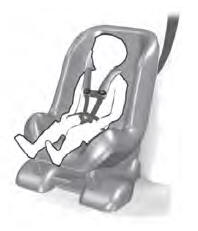Lincoln Aviator: Second Row Seats / Removal and Installation - Second Row Seat
Special Tool(s) / General Equipment
| Interior Trim Remover |
Removal
.jpg) WARNING:
The following procedure describes critical repair steps
required for correct seat component installation. Follow all notes and
steps carefully. Do not place any objects between the seat components
and the body of the vehicle, nor any objects within a joint internal to
the seat structure. Failure to follow step instructions may result in
incorrect operation of the seat components and increases the risk of
serious personal injury.
WARNING:
The following procedure describes critical repair steps
required for correct seat component installation. Follow all notes and
steps carefully. Do not place any objects between the seat components
and the body of the vehicle, nor any objects within a joint internal to
the seat structure. Failure to follow step instructions may result in
incorrect operation of the seat components and increases the risk of
serious personal injury.
NOTE: LH (left hand) shown, RH (right hand) similar.
NOTE: Removal steps in this procedure may contain installation details.
-
Release the tabs and remove the second row seat front bolt covers.
Use the General Equipment: Interior Trim Remover
.jpg) |
-
Remove the second row seat front bolts.
Torque: 35 lb.ft (48 Nm)
.jpg) |
-
Disconnect the second row seat electrical connectors.
.jpg) |
-
Position the second row seat in the full forward position.
.jpg) |
-
Release the tabs and remove the second row seat rear bolt covers.
Use the General Equipment: Interior Trim Remover
.jpg) |
-
Remove the second row seat rear bolts.
Torque: 35 lb.ft (48 Nm)
.jpg) |
-
Remove the second row seat.
.jpg) |
Installation
-
To install, reverse the removal procedure.
 Removal and Installation - Second Row Center Seat Cushion Cover
Removal and Installation - Second Row Center Seat Cushion Cover
Special Tool(s) /
General Equipment
Interior Trim Remover
Removal
NOTE:
Removal steps in this procedure may contain installation details...
 Removal and Installation - Second Row Seat - Vehicles With: Second Row Captain Chairs
Removal and Installation - Second Row Seat - Vehicles With: Second Row Captain Chairs
Special Tool(s) /
General Equipment
Interior Trim Remover
Removal
WARNING:
The following procedure describes critical repair steps
required for correct seat component installation...
Other information:
Lincoln Aviator 2020-2026 Owners Manual: Vehicle Storage
If you plan on storing your vehicle for 30 days or more, read the following maintenance recommendations to make sure your vehicle stays in good operating condition. We engineer and test all motor vehicles and their components for reliable, regular driving...
Lincoln Aviator 2020-2026 Service Manual: General Procedures - Air Conditioning (A/C) System Flushing - Vehicles With: R134A Refrigerant
Special Tool(s) / General Equipment Air Conditioning Flush and Purge Service Unit Air Conditioning Adaptor Kit Materials Name Specification Motorcraft® A/C System Flushing SolventYN-23 - Flushing NOTICE: Use the Refrigerant Identification Equipment before recovering any of the vehicle's refrigerant...
Categories
- Manuals Home
- Lincoln Aviator Owners Manual
- Lincoln Aviator Service Manual
- Interior Lamps
- Description and Operation - Jacking and Lifting
- Disabling Auto-Start-Stop
- New on site
- Most important about car
Child Seats

Use a child restraint (sometimes called an infant carrier, convertible seat, or toddler seat) for infants, toddlers and children weighing 40 lb (18 kg) or less (generally four-years-old or younger).
Using Lap and Shoulder Belts
WARNING: Do not place a rearward facing child restraint in front of an active airbag. Failure to follow this instruction could result in personal injury or death.
